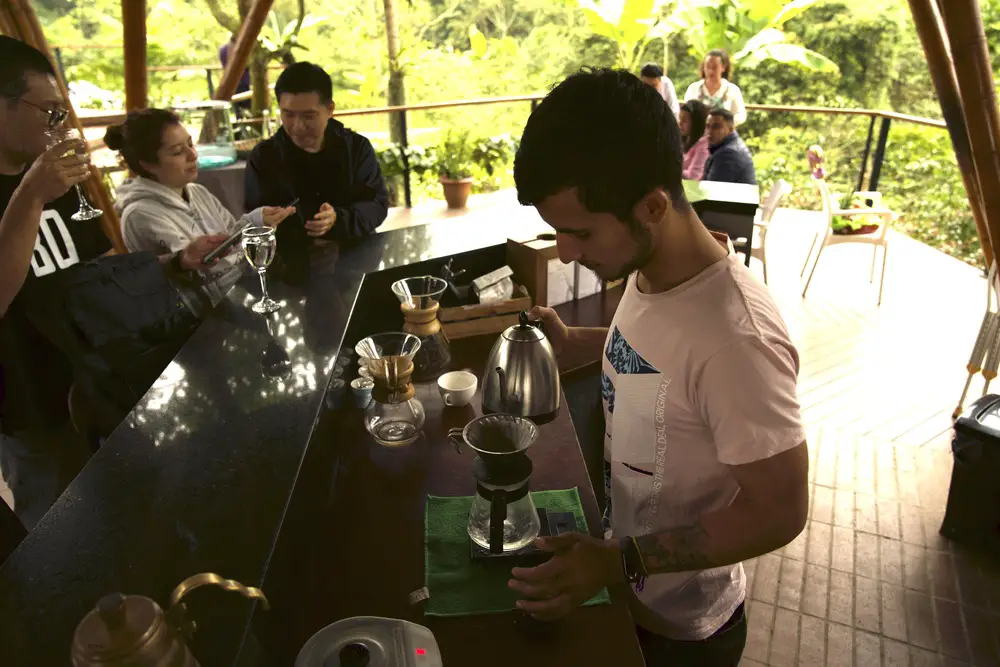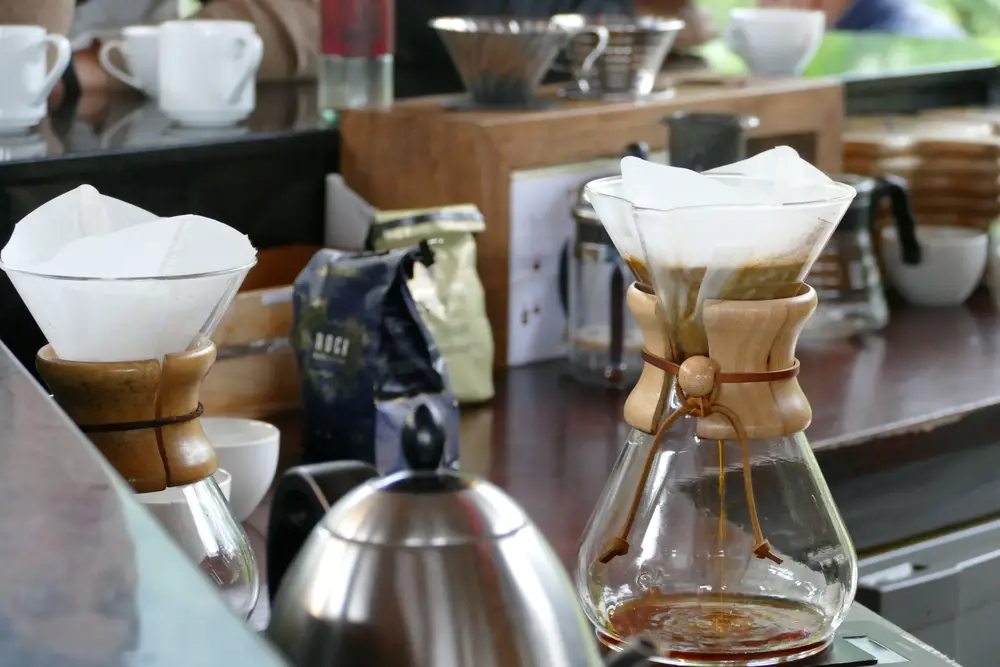A good coffee is characterized by an almost perfect balance between acidity, bitterness and sweetness.
However, most people prefer a bit more sweetness.
Table of Contents
Coffee is not naturally bitter
Most people believe that coffee is naturally bitter. In truth, however, this is not the case, because the bitterness of the coffee is produced by long roasting at very high temperatures.
This is how most coffee beans are burned during the roasting process, causing them to develop unnecessary bitterness.
The most common reason many coffee producers over-roast the beans is to try to mask the bad taste of low-quality coffee, known as pasilla in some countries.
No matter where you buy your coffee, it should be 100% Arabica beans that have been roasted to a maximum medium.
5 tips to naturally sweeten your coffee
Here are a few tips to make your coffee a little sweeter without adding sweeteners.
Choose your coffee type and degree of roast carefully
If you’re looking for the highest level of sweetness in your coffee, the first thing you should do is buy beans that are 100% Arabica and light to medium roasted.
Arabica coffee is naturally sweeter than Robusta or Liberica coffee.
In addition, this variant is easy to find in any coffee shop.
However, avoid heavily roasted or dark roasted coffee as this indicates that the beans have been roasted for too long, which in turn leads to a bitter coffee taste.
To avoid this, you should make sure that the beans are light brown in color with a medium or light roast.
In contrast, most coffee beans are very dark brown or can even be black due to the more intense roasting.
Store coffee carefully
It is important that the beans are exposed to as little oxygen as possible to prevent the oils they contain from going rancid.
Therefore, it is very important that the beans are kept in hermetically sealed containers.
Ideally, you should buy your coffee as whole beans and only grind them just before brewing, as this reduces the chance of them spoiling.
Pay attention to the roast
Buying mature Arabica beans is the first step to getting more sweetness out of the aromatic beverage.
However, roasting is the final step to boost the sweetness. Keep in mind that you’re aiming for a light to medium roast.
It should be noted, however, that fermented and unwashed beans also tend to taste sweet as they contain more free sugar.
The problem is that you have to be very careful not to over-roast the roast, otherwise the final flavor can be caramelized or chocolatey, which unevenly accentuates all of the coffee’s aromas.
This makes the coffee sweeter, but also makes it more acidic and bitter due to the caramelization of the sugar.
In contrast, over-roasted coffee beans (especially fermented and unwashed ones) have a very unpleasant taste and a texture reminiscent of wet paper.
Therefore, unless you have the knowledge and equipment to roast your coffee properly, it is best to buy pre-roasted coffee.
Pay attention to the degree of grinding
Once you have chosen the right type of coffee and the right roast, it’s time to prepare the drink.
Then you have to consider the grind you are going to use because depending on which one you choose, a different amount of oxygen can get into the beans.
This is important because depending on the amount of oxygen in the coffee, the taste becomes more bitter or sour.
Therefore, it is important that you find the right method for brewing your coffee.
Choose the right brewing method
Of all the coffee preparation methods, the espresso machine is undoubtedly the best at bringing out the natural sweetness of the drink.
You need a fine grind to use an espresso machine. The ground coffee is exposed to the water for 20 to 30 seconds. This leads to an optimal extraction.
In this way, the sugar contained in the beans remains in the cup.
Balanced oxidation can also be achieved with other methods of preparation, with the espresso machine certainly being the one that allows for a cup with more fruity or chocolaty notes.
Brewing methods such as the French press are not recommended to extract the coffee’s natural sweetness as they require a coarse grind, which means the extraction is slow.
In other words, the filtered coffee is in contact with water longer, which means that the natural sugars in the liquid are diluted more quickly.
The finished coffee is therefore less sweet, less bitter and at the same time less acidic.
So how can the natural sweetness of coffee be explained?
The first thing to remember is that the coffee beans are harvested from the center of the coffee cherry, so all of the fruit’s natural sugars go straight into the beans.
So, the beans contain carbohydrates (sugar) such as e.g.:
- Sucrose
- Arabinose
- Mannose
- Glucose
- Galactose
- Rhamnosis
- Xylose
However, due to the Maillard reaction (a chemical reaction that occurs when food is exposed to heat), the carbohydrate concentration of grains decreases during roasting.
In addition, the intensity of the reaction is time-dependent, i.e. the longer the roasting lasts, the more the sugar is broken down.
It is therefore understandable that excessive roasting increases the bitter and sour taste of the coffee.
You are probably already familiar with the Maillard reaction, as it is the same process that takes place in the preparation of other foods to give them their characteristic flavor and color.
An example of this reaction is the discoloration of meat when it is heated on the grill.
When coffee is roasted, the sugar is broken down when heated, but the aroma, antioxidants, and color are retained.
A coffee that has been roasted too much and is therefore of inferior quality can retain some nutrients and the aroma, but not the taste.
Where the coffee is grown can affect its natural sweetness
Depending on where the coffee is grown, the coffee trees contain different concentrations of natural carbohydrates.
So e.g. B. Arabica coffee beans the highest sugar content and also places such. e.g.:
Have a reputation for growing the sweetest coffees. Mainly because the crops in these countries are grown at high altitudes above sea level where temperatures are cooler.
As a result, the sugar concentration in the coffee fruits is better preserved.
The sweetest coffees in the world
There are some typical coffees from different parts of the world that are known for their particularly sweet taste as they have abundant fruity notes.
For example, in the Colombian departments of Quindío, Risaralda and Caldas, which belong to the so-called Colombian coffee axis, coffees with a very mild taste are produced.
The coffee from this area is characterized by the fact that the sour and bitter notes are slightly less pronounced than the sweet ones.
On the other hand, in other departments of Colombia, such as Santander and Nariño, coffee is found with low levels of bitterness and acidity.
In addition, countries like Panama and Ethiopia are known for producing particularly sweet coffees.
Likewise, countries like Costa Rica and Kenya are characterized by their coffees having a darker, chocolaty note, but still allowing the sweetness to stand out above the other flavors.
Sugar is irreplaceable
If after following these tips you find that the coffee is still too bitter for your taste, unfortunately you will have to use sugar.
And while adding sugar or other sweeteners isn’t the most natural or recommended thing to do, it’s certainly the most effective way to reduce coffee’s acidity and natural bitterness.
While the right brew can help tone down the bitterness we typically taste in coffee, the only way to fully sweeten our drink is by adding sugar.
However, if you’re trying to avoid sugar at all costs, there are ways other than sugar to reduce the acidity and bitterness of the drink.
Mix lactose-free milk with your daily coffee
Lactose-free milk has a shorter sugar molecule, making it taste sweeter compared to whole milk.
So, it’s a good idea to mix lactose-free milk into your daily coffee, because lactose-free milk sweetens the coffee without containing more calories than whole milk.
Summary
It is possible to increase the natural sweetness of the coffee beans if the right brew is used.
There is no way to reduce coffee’s natural bitterness and acidity more effectively than by using sugar.



